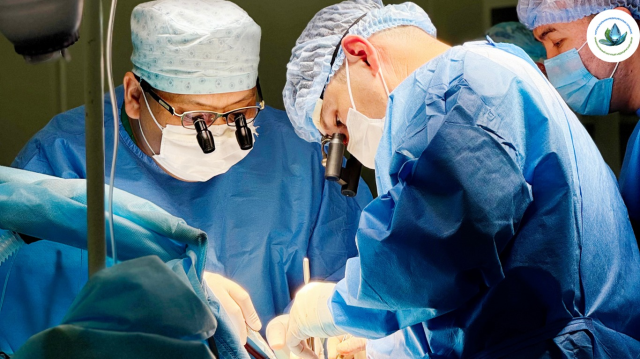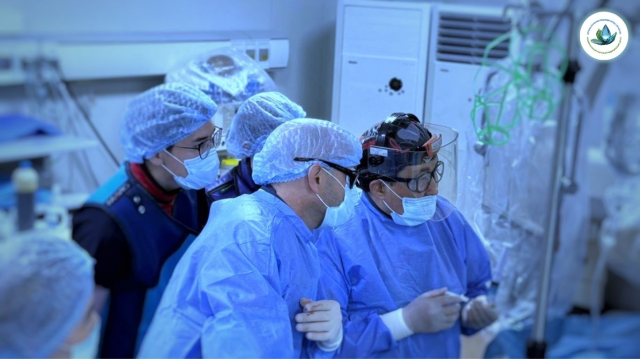A nephrologist is a doctor who deals with the diagnosis, treatment and prevention of diseases of the urinary system. Nephrological diseases develop slowly, without pronounced symptoms, timely referral to a nephrologist will help identify the disease at an early stage and prevent its development.
At the Center, you can use the help of highly qualified specialists who perfectly cope with the most complex diseases of the kidneys and urinary tract.
What symptoms should I contact a nephrologist with?
The kidneys perform an important function – they are responsible for the excretion of metabolic products, toxins and other harmful compounds. If there are any problems in their work, it affects the vital activity of the whole organism. But very often diseases of the kidneys and urinary system occur without pronounced symptoms, and at some point the disease progresses dramatically and leads to the development of a number of severe complications.
It is necessary to make an appointment with a nephrologist if the following symptoms appear:
- Lower back pain, unilateral or bilateral.
- Violation of urination. It can be anuria (a condition in which urination stops completely), oliguria (urination occurs very rarely), polyuria (the volume of urine excreted increases),
- Hematuria (blood appears in the urine).
- Proteinuria (the appearance of protein in the urine).
- Change in the color or smell of urine.
- Pain when urinating.
- An increase in body temperature for no apparent reason (for example, signs of a cold).
- Pronounced swelling of the legs and face.
For some symptoms, regular monitoring by a nephrologist is necessary. Do not postpone a visit to a nephrologist if you have been diagnosed with chronic kidney disease, hypertension, and urinary tract infections.
Conditions in which urgent consultation with a nephrologist is necessary:
- Acute pain in the lumbar region of unknown origin.
- Renal colic.
- The genitourinary system is injured.
- Acute urinary retention is noted.
In our Center, experienced specialists will carefully study your symptoms, make the necessary diagnosis and prescribe competent treatment for any kidney or urinary tract disease.
Nephrologist services
The nephrologists of our Center provide services for the treatment of a wide range of nephrological diseases. The clinic carries out the necessary rehabilitation measures to consolidate the successful result of treatment.
All types of laboratory tests can be performed at the Center and modern methods of instrumental diagnostics can be used. This allows you to diagnose kidney disorders at an early stage of the disease and take the necessary measures.
Highly qualified specialists and the latest equipment guarantee the high quality of such studies as extractorial urography, ultrasound of the kidneys and bladder. Due to the accuracy of the studies, it is possible to assess the risk of developing kidney failure and do everything possible to prevent its progression.
How is the nephrologist's appointment going?
At the reception, the nephrologist conducts a conversation to find out the symptoms of the disease. The nephrologist clarifies the details of the lifestyle, asks the necessary questions to identify a hereditary predisposition to diseases of the kidneys and urinary system, and examines the patient. To get a complete picture of the disease, a specialist prescribes the necessary studies.
Following certain rules on the eve of a nephrologist's appointment will allow you to be ready for an examination, and the doctor will help you make a diagnosis faster.
If possible, before visiting a doctor, do not drink a large amount of liquid, exclude medications (or tell the doctor at the reception which drug you are taking). Give up drinking and smoking.
What diseases does a nephrologist treat?
A nephrologist treats the following diseases:
- Pyelonephritis (an infectious and inflammatory disease affecting the parenchyma of the kidneys and the calyx-pelvic system).
- Glomerulonephritis (damage to the renal glomeruli at the immune level).
- Urinary tract infections.
- Urolithiasis.
- Amyloidosis of the kidneys (metabolic disorder in the kidneys, which provokes the formation of amyloid).
- Hypertension in combination with renal pathology.
- Metabolic and diabetic nephropathy.
- Drug-induced kidney damage (impaired kidney function while taking certain medications).
- Chronic renal failure.
Diagnosis of pathology of the kidneys and urinary system
In order for the treatment of kidney disease to be successful, it is necessary to make an accurate diagnosis.
The nephrologist uses laboratory research methods that allow you to determine the amount of necessary substances in the blood – phosphate, creatinine, urea, electrolytes, to clarify ESR and the presence of inflammation.
Additionally, instrumental research methods can be assigned:
- Angiography (X-ray examination of the kidneys).
- Ultrasound of the kidneys and bladder.
- Computed tomography of the kidneys.
- Urography.
- MRI of the kidneys.
- Cystoscopy.
Timely diagnosis allows you to prescribe the right treatment in time and prevent serious complications of kidney disease.
How to make an appointment with a nephrologist
You can make an appointment with a nephrologist by calling +7 7172 57 74 40, +7 701 094 77 71






